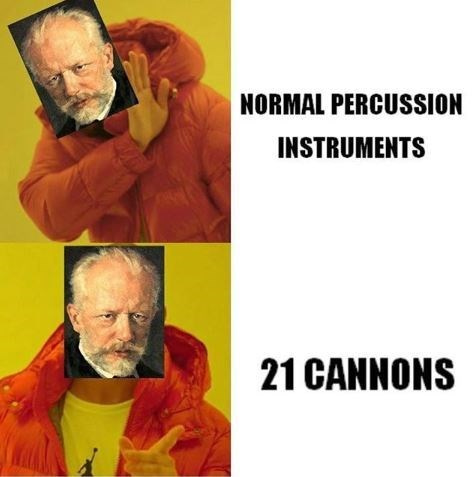Today’s article covers all the ins-and-outs of the 1812 Overture, one of the best known pieces of classical music.
This famous overture was written by one of the greatest composers of the romantic era — Pyotr Ilyich Tchaikovsky.
The 1812 Overture celebrates the Russian empire's victory over Napoleon in, you guessed it, 1812.
Composed in 1880 and performed for the first time in 1882, the 1812 Overture was immediately loved by all - except for the composer himself!
Tchaikovsky didn’t simply dislike his overture, he actually thought it was one of the worst pieces he had ever written.
This article will explain why he thought so.
Additionally, the 1812 Overture is especially noted for one big thing: the inclusion of cannons!

Yes, Tchaikovsky incorporated real cannons into this musical piece. No wonder he complained of it being “loud.”
However, despite Tchaikovsky’s aversion to his creation, the 1812 Overture continues to enthrall one and all even to this day.
In this article you'll learn about Tchaikovsky's life, the real life battle behind the 1812 Overture, and the structure and themes within the piece.
Oh, and we'll talk about those famous cannons too, of course!
Feel free to click below and skip ahead to the part that interests you most. Now, let's get started!
The Life of Tchaikovsky: A Quick Biography
Pyotr Ilyich Tchaikovsky was born in 1840 in Votkinsk, a small town in the Vyatka Governorate of the Russian Empire. He was educated for a career as a civil servant.
Tchaikovsky, however, had no interest in public service. At the age of 22 he enrolled into the Music Conservatory at St Petersburg. His friend Nikolay Rubenstein encouraged and influenced him to pursue his passion.
Within three years of taking piano lessons, Tchaikovsky was able to read music as adeptly as his teacher.
As Tchaikovsky grew older, his adult life became increasingly problematic.
His homosexuality (and resulting broken marriage), his mother’s early death, and complications arising from his relationship with his patron all contributed to instability and occasional chaos in his personal life.
All these factors, critics believe, had a profound effect on his musical works.
The death of Tchaikovsky is shrouded in mystery. Nine days after conducting the premiere of one of his most intense works, Symphony No. 6, Tchaikovsky was found dead.
The year was 1893, and the great composer was just 53 years old.
Tchaikovsky’s death was attributed to cholera, but the real reason is unknown. Many people speculate it was a suicide.
The truth behind Tchaikovsky's death will likely remain a mystery forever.
Tchaikovsky: The Star of Russian Romanticism
Tchaikovsky was a Romantic era composer, and one of the first Russian composers to truly experience international acclaim.
From symphonies to concertos, and operas to ballets, Pyotr Ilyich was a master of it all.
Some of Tchaikovsky's most famous compositions include Symphony No. 6, “Pathétique,” Swan Lake, The Nutcracker, his Violin Concerto in D Major, and, of course, the 1812 Overture.
His works contain expressive melodies and rich orchestrations. They continue to be loved by audiences all across the world.
The 1812 Overture - Historical Background and Significance
In 1880, Tchaikovsky's friend Nikolay Rubenstein was put in charge of organizing the music for an Arts and Industry Exhibition in Moscow. It was scheduled to take place the following year.
Since Rubenstein was close with Tchaikovsky, he chose his friend to compose an original overture for the event.
The piece was supposed to celebrate one of the following three topics: The inauguration of the Arts and Industry Exhibition, the completion of the cathedral of Christ the Savior, or the Russian victory over Napoleon’s Grande Armée in 1812.
Tchaikovsky was allowed to pick, and he chose the final option.
The Battle of Borodino
For inspiration, Tchaikovsky looked to the Battle of Borodino. It was a hard and bloody battle between the Russians and the French, and Napoleon's forces ultimately won.
It was a pyrrhic victory for the French, however.
They suffered a high number of casualties in the battle, and were completely cut off from both their supply lines and local resources. Many soldiers perished from lack of rations and the bitter chill of the Russian winter.
Eventually, Napoleon and his Grande Armée were forced to retreat from Russia. The French may have won the Battle of Borodino, but the aftermath of the battle ultimately led to Russian victory.
The First Performance of the 1812 Overture
Tchaikovsky finished writing the 1812 Overture in just six weeks.
In March of 1881, however, the Russian Tsar Alexandar II was assassinated. This obviously impacted the date of the Arts and Industry Exhibition, as well as the construction of the Christ the Savior Cathedral.
As such, the 1812 Overture didn't make its debut until August 20th, 1882.
While the piece was well received by the public, Tchaikovsky still wasn’t a fan of it.
In his own words, the 1812 Overture was “very loud and noisy and completely without artistic merit, obviously written without warmth or love.”
Structure of the 1812 Overture
The 1812 Overture tells the story of Napoleon’s invasion of Russia, the Battle of Borodino, and Russia’s ultimate victory over the invaders.
In the piece, Tchaikovsky uses many recurring melodies and themes to highlight different events.
For example, when the Russian Holy Synod first received word of Napoleon’s army marching towards Moscow, it put out a nationwide call to prayer.
Tchaikovsky represents this by rephrasing the Russian hymn Spasi, Gospodi, Iyudi Tvoya (O Lord, Save Thy People) in the overture’s intro.
Then Tchaikovsky uses La Marseillaise, the French national anthem, to represent Napoleon’s troops advancing towards Moscow.
Although La Marseillaise wasn't technically France’s anthem under Napoleon’s rule, it was the French anthem at the time Tchaikovsky wrote the overture.
La Marseillaise is still the French anthem today, too. That means the 1812 Overture aged pretty well!
Back to the narrative: As Napoleon gets closer to Moscow, the Russians realize their Imperial Army is just a fraction of the French Grande Armée.
As such, Russia's Tsar appeals to his people to join the army and defend their nation.
To represent the Russian people, Tchaikovsky incorporates folk melodies into the piece. These folk tunes symbolize the Russian peasants traveling to the front lines to take up arms against the French.
Then the fight begins. The music picks up, increases in intensity, and finally cannon fire sounds to signify victory and the French retreat.
Five cannon blasts ring out, followed by a reprisal of O Lord, Save Thy People to symbolize the Russian victory. The ringing of church bells and eleven more blasts celebrate the nation’s great triumph.
The orchestral arrangement in the 1812 Overture leaves nothing to imagination. From hymns to national anthems, and church bells to cannon fire, it’s certainly got it all!
Tchaikovsky's Famous Cannons
After writing the 1812 Overture, Tchaikovsky complained about it being "loud and noisy.”
Hmm…I wonder why? Who's idea was it to add field artillery, again?
The 1812 Overture is rightfully praised for being one of Tchaikovsky’s most beautiful pieces.
However, its novel use of cannons is what earns it a reputation as one of the most unique pieces in all of classical music.
When Tchaikovsky was originally commissioned to write the overture, he knew the piece would have to be grand. As such, he decided to have cannons go off at two separate occasions during the performance.
How could a composition that was supposed to commemorate victory not use artillery and gunfire?
Additionally, Tchaikovsky originally wanted all the church bells in Moscow to ring during the performance. He didn’t get his wish though, and had to remain content using only the bells of the Uspensky Cathedral.
Performances today of the 1812 Overture are rarely accompanied by the sound of actual cannon fire. Usually, background music is used along with large firework displays to make up for real cannon blasts.
Also, cannons are expensive! That's why several orchestras use alternatives like bass drums, gongs, or gunfire from rifles to play the part of the cannons in performance.
Conclusion
Despite Tchaikovsky's dislike for his creation, the 1812 Overture is clearly one of the composer’s best works.
It uses nationalist themes, Russian hymns, cannon fire and more to recount the battle of Borodino and the ultimate Russian triumph over the French.
The 1812 Overture is still well-known and loved today. It’s been used in everything from Woody Allen movies to advertisements for Quaker Puffs, and even 4th of July celebrations.
Most people, though, will probably recognize the 1812 Overture from its inclusion in the famous 2005 film, V for Vendetta:
If you don’t know where to begin with Tchaikovsky, the 1812 Overture is a great place to start.
I'll soon be writing more in-depth articles on other works by Tchaikovsky. His ballets like Swan Lake and The Nutcracker are simply too beautiful to be looked over.
To stay up-to-date on when those articles come out, scroll down to join my email list.
If you're a fan of Romantic era music, then you'll love my list of the best pieces from the Romantic Period.
Or, explore new music from the Baroque or Classical periods!
Talk soon - In the meantime, happy listening!
-Evan
